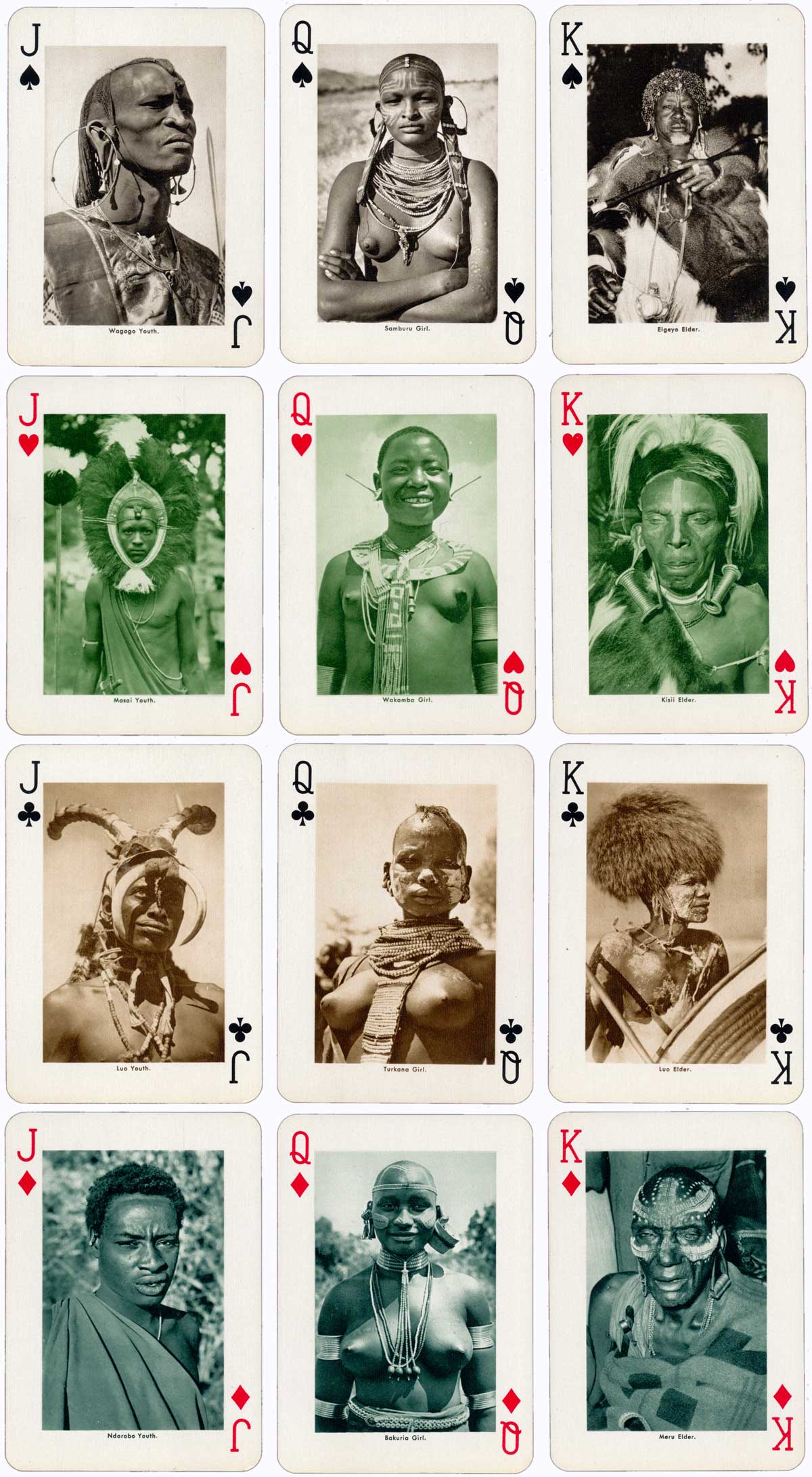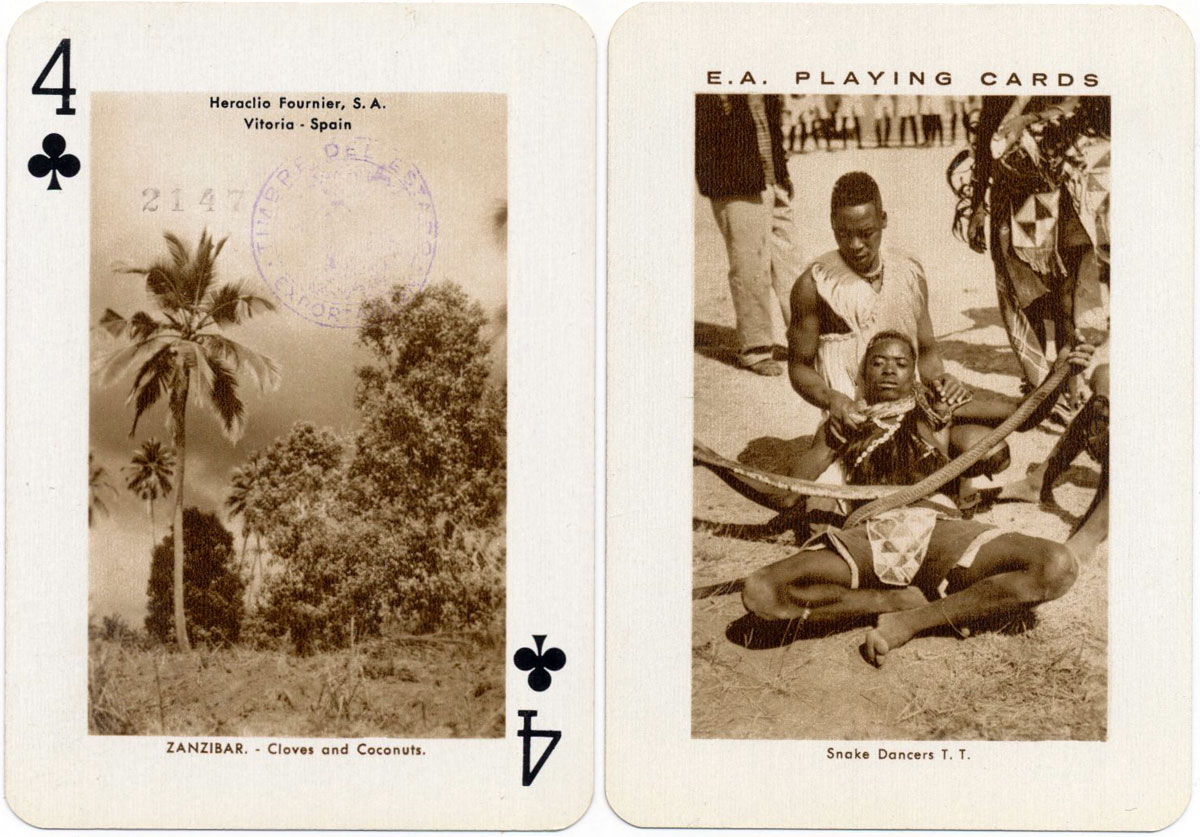East African Playing Cards
East African Playing Cards by Heraclio Fournier S.A., 1957.
East African Playing Cards by Heraclio Fournier S.A., 1st edition with different monochrome colours in each suit, published in 1957.


Above: East African Playing Cards by Heraclio Fournier S.A., first edition, 1957. 52 cards + 2 jokers + title card + explanatory booklet in mock felt slip case. A second edition was published in 1964 with all cards in the same monochrome colour.
REFERENCES
Ferro Torrelles, Victor: Variantes en los Naipes de Heraclio Fournier, La Sota No.12, ASESCOIN, Madrid, Feb 1995.
Second Edition - update by Roddy Somerville
In the second edition the images are all in a monochrome sepia colour. The tax stamp on the 4 of Clubs is a different, later one, and the manufacturer's name at the top of the 4 of Clubs reads "HERACLIO FOURNIER" rather than "Heraclio Fournier, S.A.". The two different back colours are shown. There is no booklet but instead a rather fine fold-out map of East Africa, also printed by Fournier. This map is dated 1957 so I wonder if it was also included in the first edition with the "explanatory booklet" which Matt Probert mentions. See the box►

Above: cards from the second edition of East African Playing Cards by Heraclio Fournier, 1964. 52 cards + 2 jokers + title card + map in mock felt slip case.

My guess is that this second edition had a very short life. As Kenya became a republic in 1964 under Jomo Kenyatta, I strongly suspect that they wanted to drop the images of tribespeople and concentrate more on wildlife (to attract tourists) - Roddy Somerville.

By Matt Probert
Member since March 02, 2012
I have adored playing cards since before I was seven years old, and was brought up on packs of Waddington's No 1. As a child I was fascinated by the pictures of the court cards.
Over the next fifty years I was seduced by the artwork in Piatnik's packs and became a collector of playing cards.
Seeking more information about various unidentified packs I discovered the World of Playing Cards website and became an enthusiastic contributor researching and documenting different packs of cards.
I describe my self as a playing card archaeologist, using detective work to identify and date obscure packs of cards discovered in old houses, flea markets and car boot sales.
Related Articles

Pierre Varangot
Tracing the origins, legality and legacy of Pierre Varangot’s San Sebastián deck.

Tarot de las Coscojas
Historical playing card design, tarot symbolism and an almost psychedelic medieval surrealism.

Tarot de Valverde de la Vera
A series of 24 surrealist engravings by Mexican artist Claudio Favier in which archetypal Tarot alle...

Sannois dans les étoiles
Celebrities and buildings associated with Sannois, a commune in the suburbs of Paris.

Visite Mexico
Promoting Mexican tourism with 54 different photographs in full colour.

Baraja de Juan Martín Zamorano
Deck inspired by El Pendón de los Zamorano, a military pennant dating from 1501, published by Priego...

Heráldica Castanyer No. 16
Strange variant of international pattern cards for poker or bridge.

Jim Lyngvild playing cards
Photographs of Danish royalty as imagined by fashion designer Jim Lyngvild.

Mexican ethnic playing cards
Mexican ethnic groups depicted on playing cards by Fábrica de Naipes Cuauhtemoc.

Seminole Wars deck
Seminole Wars deck by J. Y. Humphreys, Philadelphia, c.1819.

Fantasy Spanish-suited deck
Fantasy Spanish-suited deck by Bertschinger y Codina, Barcelona.

Bertschinger y Codina - Cartes Françaises
French ‘Paris’ pattern made by Bertschinger y Codina, Barcelona, c.1850.

Braulio Fournier
Baraja Nº 1 produced by Braulio Fournier, Burgos, c.1868.

Tarot Actuel 1984
Major arcana to cut out, issued with the French magazine Actuel, using photographic images.

The Glasgow Pack
Issued to celebrate Glasgow’s reign as European City of Culture in 1990, with city views and works o...

Pirritx eta Porrotx
Happy Families card game from the Spanish Basque Country.
Most Popular
Our top articles from the past 28 days



















